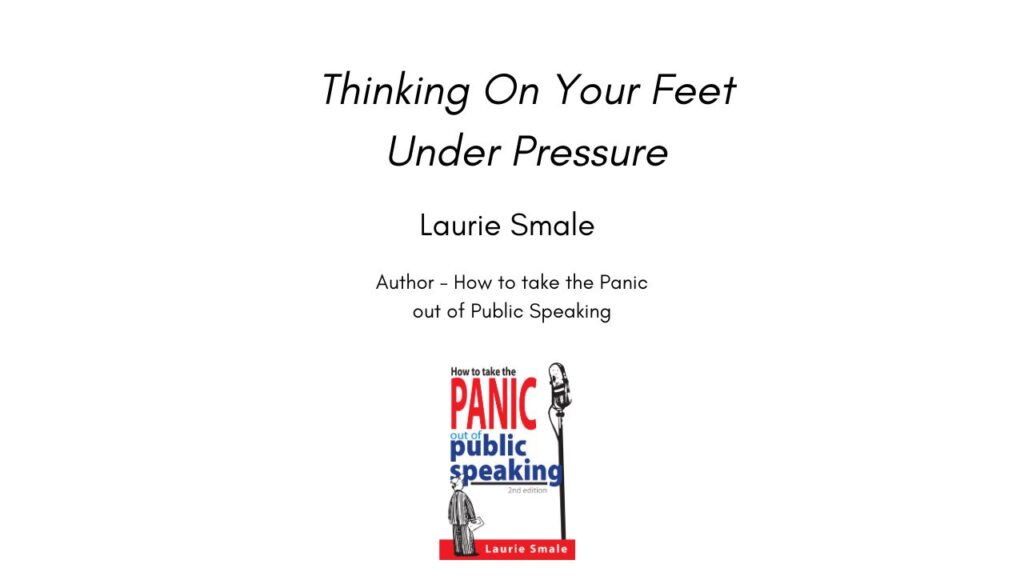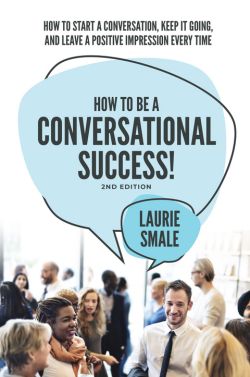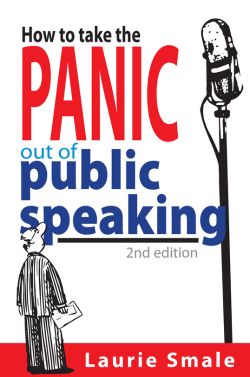Article Thinking On Your Feet Under Pressure
One scenario we all dread is being put on the spot to speak without preparation. This could be the proverbial ‘few words’ at a social occasion, a contribution at a meeting, fielding questions from the floor, or being spokesperson in a time of crisis. Here’s how to say relevant, interesting things and get yourself off the hook! This insightful article explains it all with Master Speech Coach and Inspirational Speaker Laurie Smale.
1. Make the unexpected the Expected! Here’s a way to get rid of 95% of the fear in one go. In my programs I say to people, “If you have the remotest inkling that you might be called on to speak, what would be the logical, sensible thing to do?” They think a little then invariably say, “Prepare something.” Amazingly, few people do.
“Oh, It won’t be me” they say, and front up to the occasion totally ill-prepared for the unexpected. And guess what? Chances are they’ll be invited to contribute! So instead of burying your head in the sand hoping it will all just go away, here’s what to do to take control and be ready for them.
For a start you have a general idea of the theme of the meeting you are about to attend or you have some link with the celebrity of the moment. So beforehand, think of a point you’d like to make if you were called on to speak. Write this point down long-hand in what I call the ‘focus sentence’.
Now you have a central idea to reflect on that stimulates stories and examples to back it up. Breathe life into your examples by reliving something that happened to you, something you read or saw on TV, or a case study you are familiar with. Simply relive these examples a few times from memory so your contribution is a dynamic living thing because you’ll be talking to key ideas and not concerned with the exact words you use.
Now you can open by stating the point embodied in your ‘focus sentence’; use vivid illustrative examples to back this point up in the body of your talk; and conclude by stating your main point again. Now you really are ready for them.
With this package of ‘prepared spontaneity’ in your pocket the unexpected has now become the expected and no longer frightens you. You won’t think very clearly on your feet unless you’ve done some thinking before you get on your feet! What was it that that marvellous wit Mark Twain once said? “It takes me about three weeks to prepare a good impromptu speech”… lot of truth in that! However, there are occasions where we don’t have the luxury of time to prepare beforehand and it really is a case of being gripped by panic with nowhere to go. So let’s look at ways to handle these unnerving situations.
If you’ve just arrived on the scene to learn the guest speaker can’t make it and you’ve been promoted to ‘bunny in the firing line’, the above system applies. Only this time you have a matter of minutes to get your thoughts together. The important thing here is to take control by doing something. Reaffirm the general theme of the meeting from someone then find yourself a quiet corner. After writing down the point you want to make in your ‘focus sentence’, which is the thought you’ll echo for your conclusion, latch on to an experience the audience can relate to that illustrates your main point.
Don’t sweat too much over this; the first thing that comes to mind is usually the best. Now when you step forward all you have to do is state your point embodied in your ‘focus sentence’, relive your example from memory to back it up, and conclude by restating your main point again. That’s it… that will get you off the hook and they’ll think you’re pretty clever!
If on the other hand it really is a case of being thrown to the wolves where the first you hear of your pending contribution is when you’re announced, the magic formula of Past, Present, and Future will come to the rescue.
2. Past, Present, Future Saves the Day: Recently I found myself approaching the platform in front of 200 wildly cheering Italians as the recipient of the ‘best actor’ award for my part in a play I was in. As an Italian speaking Australian of Anglo Saxon origin I never dreamed it would be me. So much was I taken by surprise that I hadn’t a clue what I was going to say. I’d broken my own cardinal rule by not preparing something beforehand when there was even the slightest chance I could be called on to speak. Then, like a gift from the gods it came to me, our magic formula: Past, Present, Future… ‘How were things then’… ‘How are things now’… ‘How will things be’… Armed with this magic little formula I confidently climbed the steps.
As Michael handed me my award I turned to the audience and began to speak to the first step of the formula: The Past ‘How were things then’. As if talking to friends across the dinner table, I told of how all I’d wanted to be was a Roman soldier to brush up on my Italian. And at the audition Michael handed me a script and said, “Read this”.
“But”, I protested, “This is Pontius Pilate!”
“You’ll be okay” Michael persisted, “just read it for me”.
After a few lines he said, “You’ll do. You’re our Pontius Pilate… But don’t worry we’ll help you.”
“And help me you did” I told my audience. “For six months you helped me with my pronunciation and interpretation of the character. But most of all you helped me in understanding myself”. (Note that sharing the spotlight with those who help us adds a human touch to the acceptance. Few people ever achieve anything entirely alone).
I then moved on to the second part of the formula, the Present, ‘How are things now’. “And to stand here today with this plaque is truly one of the most memorable moments in my life… This award is as much yours as it is mine. It will hang on my wall and I’ll look at it with pride.” (Note also that people love to know what you’re going to do with the gift).
I concluded with the final step of the formula, the Future, ‘How will things be’. So all I had to do here was speculate. “I’m sure the confidence I’ve gained from the experience, in both myself and my Italian, will stay with me forever. And if you need a Pontius Pilate for next year’s production just give me a call. I’d love to be part of it.” To a person they cheered. Not because I’m any cleverer than anyone else is, but because I had this simple formula upon which to frame my heartfelt thanks.
Extra Tip: When presenting an award or gift hold the item in your left hand so that your right hand is free to shake the recipient’s hand. If you’re the receiver of the award or gift and it is wrapped, say, “Do you mind if I open it?” People never lose the childlike excitement of a present being opened before them.
3. Allow your mind to come to your rescue:
Here’s a great idea to help enrich your answers in meetings and during question time. Dr Hewitt-Gleeson, author of Newsell, Software for the Brain and other best sellers, tells of an experience he had with Edward De Bono, the legendary pioneer of lateral thinking during a meeting with a group of very influential people. Intrigued, Hewitt-Glesson noticed that whatever question was put to his eminent colleague, he always found something relevant and worthwhile to say.
Afterwards he wryly said to De Bono, “I’ve twigged to what you’re doing… No matter what question you are asked, you say something like, ‘There are two points to make here…’ “Knowing full well that something relevant will come to mind from your subconscious bank of ideas”. And if you think about it, isn’t this the way everyday conversation works? We are continually reacting to and commenting on the unlimited array of ideas, impressions and experiences that are stored in our minds. In fact they say that everything we’ve ever experienced is filed away in there somewhere.
Ever been walking down the street and heard a familiar refrain or smelt some freshly baked bread and an image floods your mind you haven’t thought of for years? Well we’re talking about the same thing here only we’re in control of the retrieval system. Here’s the sentence I use as my version of De Bono’s marvelous little technique that will enable you to make an ‘intelligent’ contribution to the question at hand: “The interesting thing about this is…” The secret is to completely trust this simple sentence to flush out some relevant piece of information from the vastness of your subconscious mind. It works for me and I’m sure it will work for you.
Okay, let’s show you this strategy in action. In a recent seminar on presentation skills for a regional city council, I invited participants to put this technique to the test. The topic under discussion was a road blitz sprung on them the night before by two busloads of police from Melbourne. Talk about stir up a hornet’s nest! When asked to turn to a person next to them and say, “The interesting thing about this is…” the whole place was abuzz.
Yet each person discovered a different angle to talk about: many drivers caught for speeding; just a revenue raiser; keeps locals on their toes; not fair bringing police in from out of town; the use of unmarked cars; use of interstate number plates; nothing better to do with their time; big impact on the road toll; … and the list goes on. The important thing to note here is that all of these points are relevant and valid – and certainly of interest.
Because everyone sees a situation differently, there are countless possible angles on any subject. So when your memory bank hears the phrase, “The interesting thing about this is… ” It instantly crunches millions of possibilities of things you’ve experienced and miraculously comes up with a relevant item for the situation. Let’s run a small experiment here to prove my point.
Think of a current issue in the news or at home… could be anything from a political happening to buying some birdseed for your canary. Now with this issue in mind – and without any forethought- say out loud, “The interesting thing about this is…” You’ll be amazed just how easy it is to say something relevant.
Practice using this phrase, or versions of it, as a part of your everyday conversation. Use it with different issues, remembering that whatever you say, if it’s relevant, it’s valid. So now when the ideas are coming thick and fast you’ll have another technique to help you draw on the limitless knowledge of your mind to not only get you out of trouble… you’ll impress people!
In a Nutshell
- If you have the slightest inkling that you might be called on to speak, prepare something beforehand.
- Even with only minutes to prepare the same system applies, only here it’s a case of running with the first thing that comes to mind. That is, decide on the point you want to get across, state your case, relive your example from memory, and then restate your main idea to reinforce your message.
- If the announcement of your name is the only warning you get, our magic formula,Past, ‘How were things then’, Present, ‘How are things now’, and Future, ‘How will things be’ will come to the rescue.
- If thrown by the unexpected, allow your mind to come to your aid by saying “What’s interesting about this is”… then speak to the first thing that comes into your head.
These tried-and-proven public speaking tips reflect the exciting outcomes embodied in my second edition best-selling classic book, ‘How to take the Panic out of Public Speaking.’

© Laurie Smale Inspirational Speaker, Speaking Coach, and Author
ARTICLE // Thinking On Your Feet Under Pressure
By Laurie Smale, Author, How to take the panic out of public speaking 🎤
1. Make the unexpected the Expected!
2. Past, Present, Future Saves the Day
3, Allow your mind to come to your rescue
Read all the details at https://lauriesmale.com/blog/article-thinking-on-your-feet-under-pressure
All of my practical coaching wisdom is in my three books available at https://lauriesmale.com/books
#lauriesmale #article #howtotakethepanicoutofpublicspeakingbook #publicspeaking #thinkonyourfeet
Shared Online Archive.org Facebook Page Facebook Profile Google LinkedIn Page LinkedIn Profile Twitter / X








